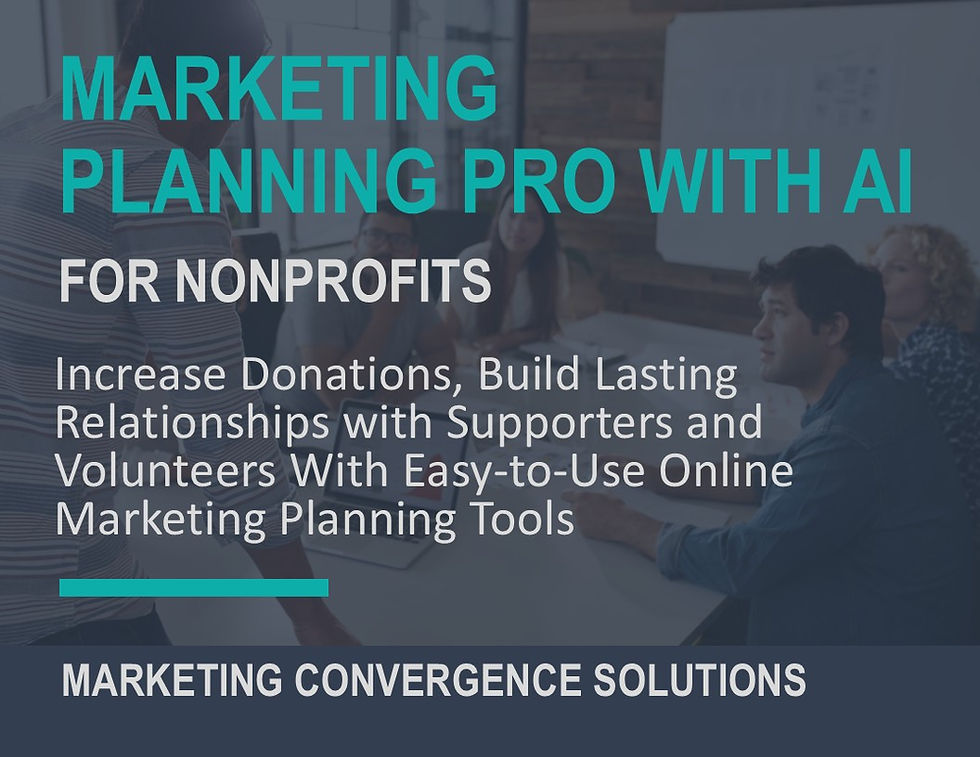Marketing Agencies and Marketers: Dig Deeper Into Your AI Toolbox to Grow Sales, Leads, and Retention in 2025
- RE Casper

- Dec 4, 2024
- 5 min read
As 2025 approaches, marketing agencies and marketers have a unique opportunity to leverage the transformative power of artificial intelligence (AI) to drive significant growth in sales, leads, and customer retention.

AI is no longer a buzzword. It has become an essential set of tools that revolutionizes how businesses attract and retain customers. From advanced audience targeting to hyper-personalized content, AI empowers agencies and marketers to outpace competitors in today’s fast-paced marketplace.
Here are practical examples of how different businesses can use AI tools to foster growth and win new customers:
1. Lead Generation
A remanufacturer of automotive engines sells its powertrain products to repair shops in the Southeast. By using LinkedIn’s AI-powered Sales Navigator, they can target new leads based on location, business type, job title, and more. Additionally, they can create a professional LinkedIn Page, share engaging content, and participate in LinkedIn Groups relevant to their audience.
Tool to Consider: LinkedIn Sales Navigator is one of the most cost-effective tools for lead generation, offering features like lead recommendations and analytics to refine targeting.
2. Search Engine Optimization (SEO)
A preschool with five locations in a large urban area wants to improve its website’s search rankings.
Tools to Consider:
BrightLocal: Ensures the preschool ranks well in local searches and appears prominently in Google Maps
Google Keyword Planner & SEMrush: Identify location-based and niche-specific keywords
AI Content Tools: Use platforms like Jasper or Surfer SEO to create optimized, engaging content
Moz Pro: Resolves backend technical issues to enhance site performance
By combining these tools, the preschool can improve its online visibility and attract more families.
3. Advanced Audience Targeting
An auto parts retailer wants to reach users actively searching for specific products. AI-driven platforms like Google Ads or Meta Ads Manager allow them to target users with high intent, such as those searching for terms like “buy car parts near me” or “wiper blade replacement.”
Dynamic search ads use AI to align with relevant searches by analyzing the retailer’s website content, ensuring the right ads reach the right audience.
4. Personalization at Scale
An e-commerce company wants to boost website conversions through personalized content recommendations. AI can analyze user behavior, past purchases, and browsing history to suggest products tailored to individual preferences.
Tools to Consider:
These platforms can significantly improve conversion rates and enhance the overall customer experience.
5. Predictive Analytics
A fitness gym wants to reduce membership churn by identifying at-risk customers. AI tools analyze historical data to predict when customers are likely to cancel. The gym can then offer renewal incentives or personalized engagement content to retain these members.
Tools to Consider:
These platforms generate actionable insights, enabling businesses to make data-driven decisions.
6. Content Creation and Optimization
A specialty equipment manufacturer wants to generate more leads through blog posts and PR content. AI tools can create SEO-optimized content about how customers are using their equipment in innovative ways, driving organic traffic and boosting engagement.
Tools to Consider:
7. Enhanced Customer Engagement
An OEM commercial truck dealer wants to make its website more dynamic and responsive to customer inquiries. By integrating an AI-powered chatbot, they can answer questions, suggest relevant solutions, and streamline lead generation.
Tools to Consider:
These tools enhance customer experiences and improve conversion rates.
8. Ad Performance Optimization
A home builder wants to maximize ROI from Google Ads. AI-driven ad platforms dynamically refine keywords, placements, and bidding strategies to ensure the ads reach high-intent users while minimizing costs.
9. Social Listening and Sentiment Analysis
A recreational vehicle manufacturer wants to understand customer needs better. Using AI, they can analyze feedback from social media to identify trends, such as demand for solar-powered RVs or eco-friendly features.
Tool to Consider:
Sprinklr: Tracks trending topics and automatically categorizes customer feedback with actionable insights.
10. Lead Scoring and Qualification
A SaaS company needs to identify and prioritize high-potential leads. AI tools analyze demographic data, engagement history, and behavior patterns to assign scores, helping the sales team focus on the most promising prospects.
Tools to Consider:
11. A/B Testing Automation
A software developer promoting a fitness app wants to optimize onboarding email campaigns. AI-powered tools can automate A/B testing, adjusting email variations in real-time based on open rates and click-through metrics.
Tools to Consider:
The Time to Act Is Now
AI is no longer optional. It’s essential for agencies and marketers aiming to thrive in 2025 and beyond.
By adopting these tools, agencies and marketers can increase measurable results, streamline operations, and deliver tailored marketing strategies that align with goals.
Start by integrating one AI tool into your strategy today. Measure its impact, refine your approach, and watch your clients’ businesses, and your own, flourish in the coming year.
Obstacles to AI Adoption
Marketers face several obstacles when adopting AI tools, ranging from training needs, costs, technological challenges to organizational resistance. Some strategies to overcome these obstacles include hiring trained AI specialists, investing in training, building organizational buy-in, and partnering with experts to guide implementation and adoption.
By addressing these obstacles strategically, marketers can unlock AI’s full potential and achieve transformative results.
Note: The writer does not endorse any specific AI tools or providers mentioned in this post.
Want More Marketing Ideas?
Visit our website, Marketing Convergence Solutions, for practical strategies to help you create a marketing plan that enhances customer loyalty, drives measurable sales results, and generates valuable leads.
Our marketing planning package includes a guidebook featuring an eight-step approach that demonstrates how collaboration between marketing and sales teams can lead to more effective marketing plans.
This comprehensive package is easy to understand and implement. It includes:
Online interactive training
Interactive planning worksheets
Presentation slides for planning sessions
Examples of measurable marketing objectives, strategies, and tactics



Comments